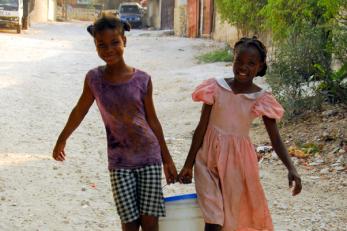The challenges of clean water and sanitation in Haiti

With a lot of help from you, Mercy Corps is looking forward to a bigger and better year in 2011. Mercy Corps had never worked here in Haiti before the earthquake last year. When we started out, we had nothing. We had to quickly make contacts and we had to find out where we could help: whether in Port-au-Prince’s devastated urban setting or in other parts of the country where displaced families fled the destruction. It was important to focus on areas of greatest need but not to duplicate work carried out by others.
We coordinated with other agencies, went to lots of meetings and spent long days traveling to the field to carry out assessments, especially finding out what the water and sanitation needs were. Things are very different in Haiti from other countries where Mercy Corps works and where I have previously worked.
For me personally, one of the biggest differences from my previous emergency response work is that the disaster hit an urban area. I've been more involved in water and sanitation issues in rural and remote areas. But now here we are, and most of a year has been spent working on water and sanitation challenges for displacement camps and wrecked neighborhoods in Port-au-Prince.
Providing these kinds of services to displaced families in such a large and chaotic city has been a particular challenge for our team. I've been used to working in refugee camps or villages where everyone is in one spot, whereas earthquake survivors in Port-au-Prince have put tents wherever they could find a place. So for the Mercy Corps team, that meant finding and helping people wherever they are.

Another real challenge for the water and sanitation team has been latrine construction. In other places I’ve worked on crisis responses, it's relatively easy. Here, because the camps are on private land, we haven't been allowed by the landowners to construct latrines — so we've had to use portable toilets, which are a more expensive solution. We would have liked to construct more of them — and to train young Haitians how to construct things like this — but couldn't. However, something promising on the horizon is that we’ll soon be able to help people returning to their homes to build household latrines for their own houses.
Something that is also different about Haiti: even though we're in an urban area, there is no piped sewer system anywhere. Nowhere in the whole country. Some people have septic tanks, but these are only the more wealthy. There is only one place in Port-au-Prince to get rid of sewage at present, and that is a landfill. It’s not a usual or best practice to mix sewage with garbage. Haiti's lack of waste treatment centers and sanitation infrastructure is especially dangerous in towns in rural areas during an epidemic of cholera — because waste contaminated with bacteria can rapidly sicken others.
One especially sobering fact: Haiti is the only place in the world where the number of people with access to toilets actually decreased between 1990 and 2006, apart from the Federated States of Micronesia, which suffered a minor decline. That makes Haiti worse than Ethiopia, Chad, Somalia, Afghanistan or any other country you could name. And then the earthquake didn't help that situation.
And yet, despite these almost-unbelievable challenges we’ve faced, Mercy Corps has been able to provide water and sanitation services to make a difference. We have established relationships with people in the camps, in other agences and in the government. We’ve hired Haitian earthquake survivors and trained them how to implement water and sanitation solutions. I'm confident this team can do great things in 2011.
Here’s one example of a very positive change which has taken place in Haiti over the last year: the Haitian government’s water and sanitation agency — DINEPA— has been doing a lot of good work. They have created a new policy for waste disposal for the first time in history and they have been working with non-governmental organizations like Mercy Corps to distribute water purification tablets and improve water quality in towns all over Haiti — a vast territory. That never happened before.
DINEPA have been testing water quality all over Port-au-Prince: in water sales kiosks, water trucks, wells, boreholes and public taps. They have been chlorinating piped water supplies in towns all over Haiti. We work together with the government as much as possible. When Mercy Corps had a training for our staff on hygiene promotion, we invited an official from DINEPA to come — he said he learned a lot.
Over the last year, we’ve all been learning a lot about how to ensure clean water and better sanitation for earthquake-displaced families. With the support of all of you who are contributing so much to our work, I’m confident that we will continue to make a difference in the coming year.